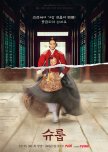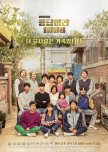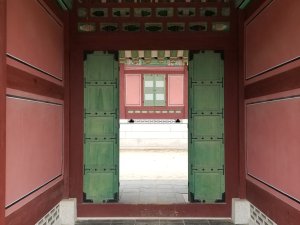
Under the Queen's Umbrella
3 personnes ont trouvé cette critique utile
Can't figure out who's who in UTQU? Maybe this will help!
This is not a review (suffice it to say this is my favorite sageuk of all time), but an attempt to help viewers not get scared off by this very large Royal Family with an endless number of concubines and princes. I want to help you know who's who!Even with all my exposure to Kdramas and sageuks, I was hopelessly lost and confused in Episodes 1 and 2 because there were so many characters to navigate! I kept having to pause the episode to decipher who everyone was and how they were related to each other (even despite all the helpful descriptive labels provided at the beginning for each character you meet).
So, here's a CHEAT SHEET that might help you keep everyone straight. The following is a description of important titles and names of prominent characters in the drama and their significance and importance in the court/royal family:
***Don't worry, there are NO SPOILERS below, but if you want to figure everything out on your own, don't read any further.***
The Queen is the King's "head" wife and the concubines/consorts (the king has about 10 of them!) are his other wives with a lesser status than the Queen.
The Queen has five sons with the King (from oldest to youngest): the Crown Prince (the word "Crown" designates that he will be the next king) (the perfect son), Grand Prince Seongnam (the mysterious wild child), Grand Prince Gyeseong (gentle and kind), Grand Prince Muan (sweet and charming but obsessed with girls), and Grand Prince Ilyeong (into math and astronomy and "still just a kid").
Any other princes without "Grand" in front of their title are sons the king had with one of his concubines (aka Prince Ui Seong (actually the oldest of all the king's sons, even older than the Crown Prince, and a BAD EGG), Prince Bogeom (the most intellectually promising of the brothers after the Crown Prince), Prince Simso (good-hearted but struggles to measure up), etc.). There are more princes, but these are the only ones featured heavily.
The "Grand Heir" refers to the son of the Crown Prince (he's about 4 or 5 years old in this), who is next in the line of succession to inherit the throne. He will become Crown Prince when his father (the current Crown Prince) becomes king, and is technically 3rd in line for the throne.
The oldest son of the King and Queen is traditionally chosen as the Crown Prince, and is given preference over the concubines' sons in the line of succession (which is why Prince Ui Seong, despite being the oldest son of the king, is not the Crown Prince since he's only the son of a concubine).
The "Queen Dowager" refers to the mother of the current King, though interestingly, she was just one of the previous king's concubines... so, how did the current king rise to the throne despite being the son of a concubine?
I will let you figure out the rest. :)
I hope this was helpful!
NOTE for those who haven't seen many sageuks (aka historical Kdramas): I will add something here about costumes in case it helps:
The "hanbok" is the name for the traditional Korean attire worn by men and women alike. The style of each is different, but they're referred to by the same name.The King always wears a bright red hanbok, with a gold circle embroidered on his chest, as well as gold circular patches on his shoulders. The Queen will have the gold patches on her torso and shoulders, like the king, but her hanbok will be different colors. The Crown Prince traditionally wears a dark blue hanbok with silver circles embroidered on his chest and shoulders.
If a character has a top-knot (a bun on the top of their head), then it's a guy. Sometimes it's hard to tell because the guys look so beautiful and they could pass for a girl, but this drama has no cross-dressing, so it's always going to be a guy. Guys with beards and dark red, purple or green hanboks with a square embroidery pattern on their chest with a square belt that protrudes out in front of their waist as well as hats that look like they have wings coming off the sides (I think they're called a samo) are going to be the princes' tutors and/or ministers who hold power in court and advise the King.
Maidens (unmarried women) have their hair slicked back into a braid that rests tightly against their neck. Married women (so, the Queen and concubines) have their hair slicked back into a bun that sits at the base of their neck. Most of the time in this drama if you see a woman with her hair in a bun and a bright, gaudy hanbok of various colors with fabric that covers her hands resting at waist-level, you're looking at a concubine or the Queen (though her hanboks are usually darker, deeper colors and less gaudy). If she's old and stern, haha, it's the Queen Dowager.
Cet avis était-il utile?

Cette critique peut contenir des spoilers
We Can Never Go Back To How Things Were
The "Reply" dramas are weirdly edgier than most dramas in random ways (Reply 1997 turned me off for this reason and honestly it's just not as good, though the Busan accents were fun to hear, and they're not featured in Kdramas much)), but despite that, Reply 1988 in particular really delivers.I'll admit, the first 1/3 of this drama was SO slow and boring for me (the episodes are up to an hour and a half!! Too long 😭). I kept thinking, "What on earth makes everyone love this?" It took me forever to start caring about the characters (the main female lead was too ditzy and flighty for me at first) and acclimate to the weird goat bleats that characterize the comedic moments, but slowly the characters grew on me as I watched them grow (the comaradarie of the main 5 friends was so heartwarming!). At some point, around Episode 5, I became hooked. It does have such a nostalgic quality to it, and the last 15 minutes or so gave one of the biggest gut punches I've ever felt at the end of a drama. I never weep watching Kdramas (maybe once in a blue moon I'll shed a tear), but at the end of this drama, I was sobbing.
This drama doesn't try to say the past was better or that we should or would want to return to it, but at the same time it breaks your heart to see what was lost (and can never be had again) once time moves forward. It just makes you ache with sadness when it's over.
If I could describe this drama in one word, it would be "nostalgia." As Deok Sun says as she narrates the ending voiceover, we can never really "go back"; we can return and "come home" but what happened in the past can never be replicated or experienced in the same way again, and that makes us ache and pine for it when the memories are good and sweet. I think it's particularly true when we think back on a good childhood. A childhood filled with family, a strong community of friends and neighbors, and safe places to fail and mess up. We must grow up and learn from those mistakes so we can leave Neverland behind and embrace adulthood and the future with boldness.
Highly recommend!
Cet avis était-il utile?
























